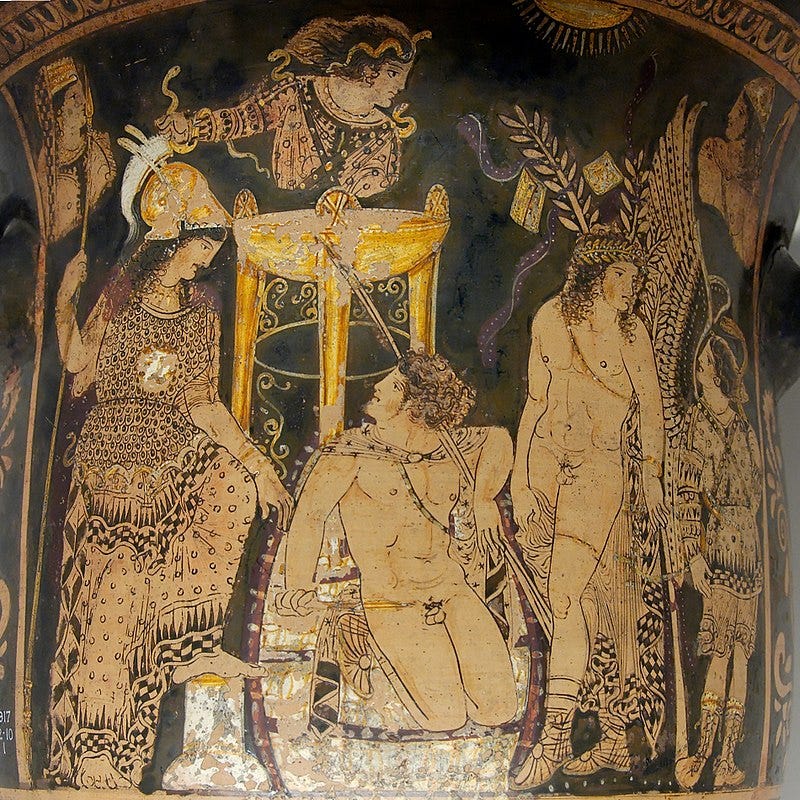Oresteia 3.6: Orestes gets pursued by the Furies
Summary 14 # Man, God, and Society in Western Literature - From Gods to God and Back
Orestes has punished the murderer of his father, King Agamemnon, and in doing so, has made universal justice, associated with the god Apollo, triumph. Although he used the vengeful power of the Furies, he did not avenge his father in their name. The chorus sees in his action a break in the cycle of hatred and revenge:
"You have freed the land of Argos by cutting off the heads of two serpents in one blow."
Yet, Orestes finds no peace and feels terrible for having killed his own mother. He cries out:
"Ah, ah! What women are these, like Gorgons in grey robes, wrapped in snakes? No, I can no longer stay here."
The chorus tries to convince Orestes that he is merely hallucinating:
"What illusion chases you around like a whirlwind? You are your father’s favorite on earth. Stop! Do not be afraid, you are the great victor."
They emphasize that his mind is confused:
"The blood is still fresh on your hands. Truly, this is what is troubling your mind."
But Orestes remains adamant, living in a different reality:
"Here. You do not see them, but I do. They are driving me away. No, I can no longer stay."
To bring Orestes peace, something must be done with the Furies; they must be transformed into a positive social force. If this could be achieved, there would be an integrated culture of reason and emotion, for which the help of the Olympian gods is needed. Orestes, therefore, seeks refuge in the temple of Apollo.
The priest of the temple panics when he sees Orestes. He exclaims:
"Oh, things too terrible to speak of, too terrible to face, drive me out of Apollo’s house. I have no strength left to stand, and I run on my hands, not with the speed of my feet."
He continues:
"I walk into the sacred space with the wreaths and see there, by the navel stone, a man, impure in the eyes of the gods, sitting as a suppliant, his hands dripping with blood, holding a drawn sword and a full branch of olive."
Before this man lies a strange group of beings:
"And before this man, a strange troop of women is asleep in chairs—no, not women, I mean Gorgons (…) They snore with repulsive breaths, from their eyes flows disgusting liquid."
Then Apollo appears, the god of reason, in whose name Orestes avenged the king. Apollo speaks disparagingly of the Furies:
"They have fallen asleep, those loathsome maidens, gray monsters, whom no god, no man, no beast ever approaches."
Apollo then stands firmly behind Orestes, confirming what was mentioned earlier—that Orestes killed Clytemnestra at Apollo’s urging:
"There we will find, with justice for your case and with enchanting words, the means to free you from this suffering forever, for I urged you to kill your own mother."
The final debate begins between Apollo and the Furies, with Athena serving as the judge.
More in the next post Summary # 14





